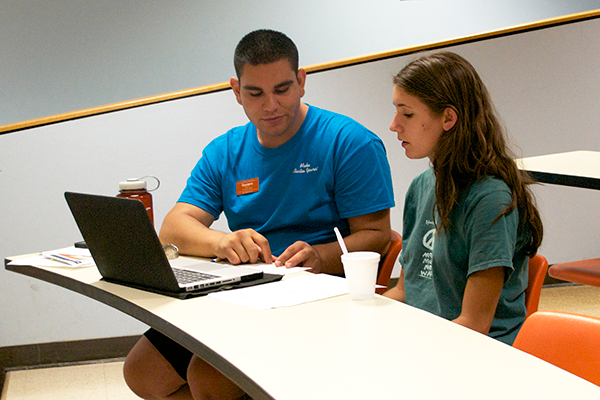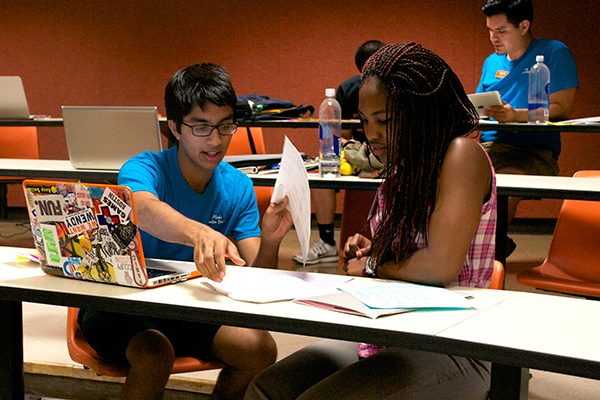Being an incoming freshman at a major university can be an overwhelming experience, and the students who work as orientation advisors (OAs) understand the feeling.
“I wanted to become an orientation advisor because my freshman orientation was my first time visiting UT,” says Gustavo Molinar, a psychology sophomore. “I was nervous to start in a new city at new school, and the orientation advisors actually helped me a lot to rest my worries and assure me that everything was going to be fine.”
Sarah Villarreal, a geography senior, worked as a mentor for a first-year interest group (FIG) during her junior year of college. The experience helped her realize that working with students and helping them acclimate to university life is what she wants to do for a living. It also led her to the role of orientation advisor.
“As a FIG mentor you’re with them for their first semester of college, which is really special, but I had missed their orientation experience, so I felt like a chunk was missing,” Villarreal says. “Today as an orientation advisor, I just advised one of my future ‘figlets,’ so [I] get to be with them every step of the way.”
Each year, New Student Services at The University of Texas at Austin selects 100 students across campus to become orientation advisors through an extensive application and interview process. Those selected begin training through a three credit hour course in January. The classes cover topics like using inclusive language, course registration, campus tours, basic resident assistant training and discussion facilitation.
“We have a very expansive training,” Villarreal says. “They told us when we started training, ‘Everything we teach you in this class, it’s going to pay off – you’re going to use everything you learn.’ And we definitely have.”
There are 18 orientation advisors representing the College of Liberal Arts at orientation this summer. During their training each week, the OAs met with Craig Gilden, senior academic advisor for the College of Liberal Arts, along with former academic advisor Valeri Nichols-Keller. Each meeting involved preparation for liberal arts-specific orientation tasks.
“Within liberal arts, we have three goals for students at orientation,” says Gilden. “One is getting students registered with a viable schedule for the fall semester, the second is helping students understand the academic expectations of themselves as college students and the third is helping students find a sense of belonging at UT Austin and the College of Liberal Arts.”
Orientation advisors contribute to the liberal arts college meeting, which gives incoming liberal arts students different perspectives on how to be successful at UT. Advisors also meet one-on-one with students during peer advising sessions.

“The reality of orientation is that outside of each other, students interact with and ask questions of the OAs more than any other staff on campus,” Gilden says. “They do an amazing job of promoting liberal arts programs and helping our incoming students feel welcomed and as relaxed as possible about starting school here.”
Because they’re still in college themselves, OAs have a unique perspective when giving advice to incoming freshmen about their first semester at UT.
“Show up to everything, whether it’s a class or an organization meeting,” Molinar says. “And not only show up, but give it everything and make your experience your own. It’s great to have advice from everyone else, but it’s also important to make your own experience for yourself.
“It’s normal to be nervous,” Villarreal adds. “Don’t overburden yourself your first semester, because it definitely sets the tone for the next four years. Branch out and do things you wouldn’t normally do, because you’d be surprised how your interests change. You shouldn’t rush your university experience, because you do change so much from your first day on campus to your last day.”
Orientation at UT is an important experience, and it doesn’t just impact the incoming students.
“We really care about students,” Molinar says. “We’re here throughout the whole summer, we’ve been training since January and the things we’ve learned–it’s for them, but I’ve realized that it’s also for us. I’ve changed a lot; we learn so much about social justice and campus issues that we wouldn’t talk about in a different setting. It’s really about creating a culture of care here at UT.”
For more information about orientation, visit the Student Affairs website.
